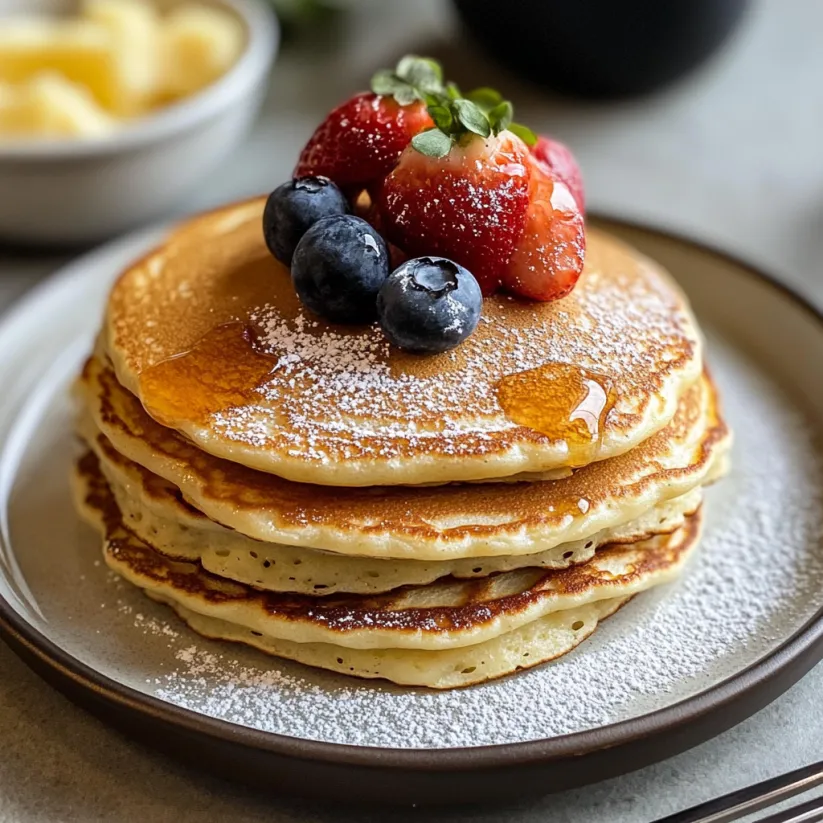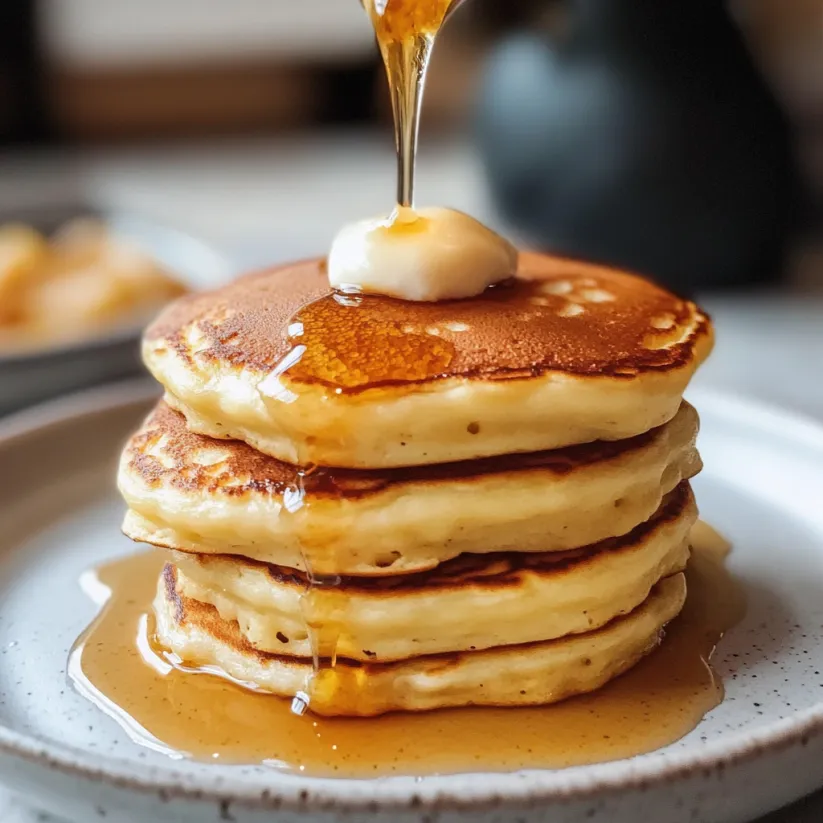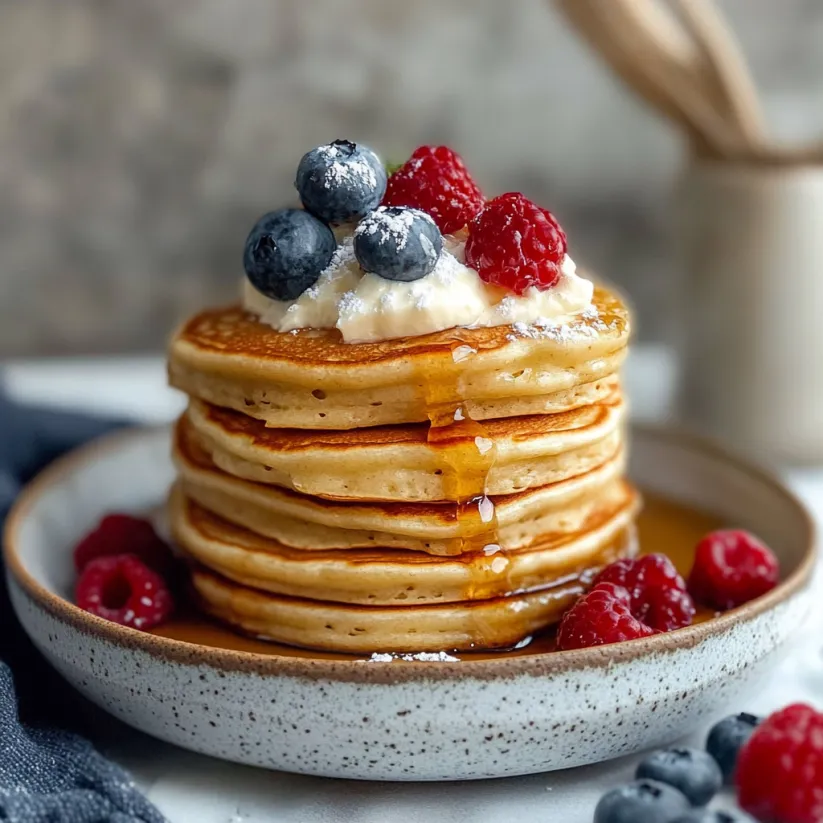 Save Pin
Save Pin
These cottage cheese pancakes have revolutionized my breakfast routine with their incredible fluffiness and impressive 20 grams of protein per serving. The combination of simple ingredients creates pancakes that satisfy both my sweet cravings and nutritional goals without weighing me down for the day ahead.
I created these pancakes while searching for a breakfast that would keep my family energized through busy mornings. Now they've become our weekend tradition, with everyone choosing their favorite mix-ins and toppings.
Ingredients
- Rolled oats: Create a hearty texture while keeping these pancakes gluten free if you use certified oats
- Cottage cheese: Adds moisture creamy texture and impressive protein without tasting "cheesy"
- Large eggs: Provide structure and additional protein for staying power
- Pure maple syrup: Adds just the right touch of natural sweetness
- Vanilla extract: Enhances the flavor profile with warmth and depth
- Baking powder: Ensures these pancakes rise properly despite their dense ingredients
- Ground cinnamon: Optional but adds a wonderful aromatic quality
- Butter or oil: For cooking prevents sticking and adds a beautiful golden edge
Step-by-Step Instructions
- Preheat and Prepare:
- Turn your oven to 200°F if you plan to keep pancakes warm between batches. This gentle heat maintains their texture without drying them out while you finish cooking the entire batch.
- Blend the Batter:
- Add oats cottage cheese eggs maple syrup vanilla baking powder and cinnamon to a high speed blender. Process until completely smooth and creamy which typically takes about 30 seconds. The texture should be thick yet pourable with no visible oat pieces. Stop and scrape down the sides if needed to ensure even blending.
- Add Mix-ins:
- Transfer the batter to a bowl and gently fold in any optional ingredients for your chosen variation. Allow the batter to rest for 5 minutes which lets the oats hydrate slightly and the baking powder activate properly creating fluffier pancakes.
- Prepare the Cooking Surface:
- Heat a griddle or nonstick skillet over medium low heat. The lower temperature is crucial as these protein rich pancakes need gentle cooking to prevent burning. Brush with a light coating of butter or oil to prevent sticking.
- Cook the Pancakes:
- Pour ¼ cup portions of batter onto the hot surface creating 3 to 4 inch pancakes. Watch for bubbles to form on the surface and edges to appear dry which takes approximately 2 to 3 minutes. Flip with a thin spatula and cook an additional 1 to 2 minutes until golden brown and cooked through.
- Keep Warm and Serve:
- Place finished pancakes on a wire rack set over a baking sheet in your preheated oven. This maintains warmth while preventing sogginess. Continue with remaining batter adding a small amount of butter or oil between batches. Serve with your favorite toppings.
 Save Pin
Save Pin
The cottage cheese is truly the magic ingredient in this recipe. I discovered its transformative powers in pancakes after a friend suggested it and I was skeptical at first. Now I cannot imagine making protein pancakes any other way the texture is incomparable to protein powder versions.
Flavor Variations
The beauty of this basic recipe lies in its versatility. For lemon blueberry pancakes add the zest and juice of one small lemon to the batter then gently fold in fresh or frozen blueberries. The brightness of citrus complements the subtle sweetness perfectly.
Chocolate chip lovers can add 1/2 to 2/3 cup of chocolate chips to the batter. I recommend mini chips for better distribution throughout each pancake. For an extra special touch use dark chocolate chips which provide antioxidants alongside their rich flavor.
 Save Pin
Save Pin
The cinnamon pecan variation transforms these pancakes into a fall inspired treat. Increase the cinnamon to 1/2 teaspoon and fold in 1/2 cup chopped pecans. The nuts toast slightly during cooking enhancing their natural buttery flavor.
Storage Solutions
These protein packed pancakes maintain their quality remarkably well after cooking. Store leftovers in an airtight container in the refrigerator for up to two days. The texture remains tender thanks to the moisture from the cottage cheese.
For longer storage freeze pancakes in a single layer on a parchment lined baking sheet until solid approximately one hour. Transfer to a freezer bag removing as much air as possible and store for up to two months. This method prevents them from freezing together in a clump.
Reheating couldn't be simpler. Pop refrigerated pancakes in the toaster on a medium setting for a crisp exterior or microwave for 20 to 30 seconds for a softer result. Frozen pancakes can be reheated directly from frozen either in the toaster or microwave for slightly longer.
Making Ahead Tips
The batter can be prepared the night before and stored in an airtight container in the refrigerator. Morning preparation becomes effortless simply give it a gentle stir before cooking. The texture may thicken slightly overnight so add a tablespoon of milk if needed to achieve the right consistency.
For ultimate morning efficiency make a double batch on weekends freeze the extras and enjoy homemade protein pancakes any day of the week with minimal effort. They make excellent grab and go breakfasts when spread with nut butter and folded in half.
Commonly Asked Questions
- → Can I make these pancakes ahead of time?
Yes! These cottage cheese pancakes store well. Keep them in an airtight container in the refrigerator for up to 2 days. For longer storage, freeze them in a single layer on a parchment-lined baking sheet, then transfer to a freezer bag where they'll keep for up to 2 months.
- → How do I reheat these pancakes?
Reheat refrigerated pancakes in a toaster on medium setting or briefly in the microwave. Frozen pancakes can be reheated directly from frozen using the same methods, though they may require slightly longer heating time.
- → Can I substitute the cottage cheese?
Cottage cheese is essential for the protein content and texture of these pancakes. However, ricotta cheese can work as a substitute with a similar protein profile, though the texture may be slightly different.
- → Are these pancakes gluten-free?
These pancakes can be gluten-free if you use certified gluten-free rolled oats. Oats are naturally gluten-free, but cross-contamination can occur during processing, so check packaging if you have celiac disease or gluten sensitivity.
- → What's the best way to blend the batter?
A high-speed blender works best to create a smooth, creamy batter. Blend until the oats are completely broken down and the mixture is uniform. If you don't have a high-speed blender, a food processor can work, though you may need to blend longer for the same smooth consistency.
- → Why do my pancakes fall apart when flipping?
Wait until bubbles form on the surface and the edges look dry before attempting to flip. These pancakes need slightly longer to set than traditional pancakes due to their higher moisture content. Also, ensure your heat isn't too high—medium-low is ideal.
